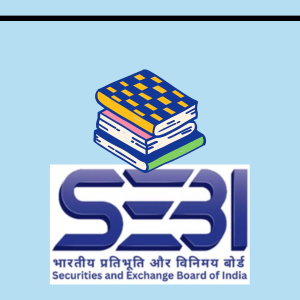
If you aim to become a SEBI Grade A Legal Officer, you are not merely applying for another government post – you are stepping into the core of India’s financial regulatory ecosystem. The Securities and Exchange Board of India (SEBI) serves as the central authority that safeguards the integrity of the securities market, ensures adherence to corporate governance standards, promotes market development, and protects investor interests.
Serving as a SEBI Legal Officer involves much more than legal drafting. These professionals are entrusted with enforcing securities regulations, interpreting complex market norms, and ensuring transparent and ethical market functioning. To excel in this exam, aspirants must approach it with precision and strategy, beginning with a thorough understanding of the syllabus and the relative weightage of each component.
Why the Legal Stream at SEBI Is a Unique Challenge?
Most competitive examinations for legal roles focus primarily on traditional subjects such as the Indian Contract Act, Law of Torts, Company Law, and Civil Procedure Code (CPC). However, SEBI’s Legal Officer role extends far beyond these basics. It requires expertise in drafting and interpreting regulatory frameworks, addressing intricate issues under securities law, including insider trading, takeover regulations, and mutual fund compliance.
In addition to legal proficiency, candidates must also understand the intersection between law and financial markets, especially in protecting investors’ rights, ensuring transparency, and maintaining market discipline. Hence, this role demands not only legal acumen but also a sophisticated grasp of financial regulatory mechanisms.
Structure of the SEBI Grade A Examination
The SEBI Grade A Legal Exam is conducted in three phases (SEBI Recruitment Notification, 2024):
- Phase I – Online Screening Test
- Paper 1: General Awareness, English Language, Quantitative Aptitude, and Reasoning Ability.
- Paper 2: Subject-Specific Questions (Legal Stream).
- Paper 1: General Awareness, English Language, Quantitative Aptitude, and Reasoning Ability.
- Phase II – Online Written Examination
- Paper 1: English (Descriptive).
- Paper 2: Legal Stream (Advanced Level).
- Paper 1: English (Descriptive).
- Phase III – Interview
Candidates who qualify in Phases I and II are shortlisted for the interview stage, where their analytical and legal reasoning skills are assessed.
Understanding the Legal Syllabus: What Really Counts
The SEBI Grade A Legal Officer exam encompasses a vast legal and regulatory framework, combining traditional law subjects with financial and securities market regulations. To navigate it effectively, aspirants must understand the weightage of each topic and tailor their preparation strategy accordingly.
Phase I – Paper 1 (General Aptitude Section)
Although this paper is not directly related to law, it serves as a crucial screening stage. It evaluates candidates’ analytical and language proficiency, which are essential for regulatory reasoning.
Key Components
- General Awareness: Current events, financial policies, RBI and SEBI updates, and major regulatory reforms.
- English Language: Grammar, comprehension, and vocabulary skills.
- Quantitative Aptitude and Reasoning: Numerical accuracy, logical sequencing, and data interpretation.
Excelling in this phase ensures a foundation for progressing to the specialized legal section.
Phase I – Paper 2 (Legal Stream)
This section forms the cornerstone of SEBI’s Legal Officer selection, as it evaluates candidates’ grasp of core legal principles and their application to regulatory contexts.
Primary Subjects Covered:
- Constitution of India
- Law of Contracts: Indian Contract Act, 1872; Sale of Goods Act, 1930; Indian Partnership Act, 1932; Specific Relief Act, 1963
- Civil Procedure Code, 1908 (CPC)
- Transfer of Property Act, 1882
- Arbitration and Conciliation Act, 1996
- Limitation Act, 1963
- Administrative Law and Principles of Natural Justice
- Jurisprudence
- Law of Torts and Consumer Protection Act
Given SEBI’s quasi-judicial role, its officers regularly engage in adjudication, appeals, and tribunal proceedings. Hence, a strong understanding of contract and property law facilitates the interpretation of transactions and regulatory frameworks. Similarly, constitutional and administrative law form the backbone for interpreting fundamental rights, principles of natural justice, and separation of powers, which are critical in regulatory decision-making (SEBI, 2023; NISM, 2023).
Phase II – Paper 2 (Legal Stream Advanced)
The second phase’s legal paper carries the highest weightage and focuses on advanced topics involving the financial market, securities law, and corporate regulation.
Core Topics Include:
- Criminal Law: Selected provisions from the Indian Penal Code (IPC) and Code of Criminal Procedure (CrPC)
- Law of Evidence: Indian Evidence Act, 1872
- Corporate Laws: Companies Act, 2013; Limited Liability Partnership Act, 2008; Insolvency and Bankruptcy Code, 2016
- Securities Laws: Securities Contracts (Regulation) Act, 1956; SEBI Act, 1992; Depositories Act, 1996; and SEBI’s key regulations on Prohibition of Insider Trading (PIT), Takeover Code, and Listing Obligations and Disclosure Requirements (LODR)
These areas are vital, as SEBI oversees how companies raise and manage capital, regulates public offerings, and enforces disclosure standards (SEBI, 2024).
Prioritization and Study Strategy
Given the breadth of the syllabus, efficient time allocation is indispensable.
High-Priority Topics:
- Securities Laws, SEBI Act, Takeover Regulations, and Insider Trading provisions — high scoring and frequently tested.
- Key chapters of the Companies Act related to corporate governance, disclosure obligations, and compliance.
- Contract Law, CPC, and Arbitration – conceptually strong and practical for case-based questions.
- Current affairs involving SEBI orders, market reforms, and enforcement actions — crucial for descriptive papers and interviews (ixamBee, 2024).
Medium-Priority Topics:
- Constitutional Law, Administrative Law, and Jurisprudence – theoretical yet foundational.
- Transfer of Property Act, Law of Torts, and Consumer Protection Act – lighter but conceptually relevant.
- Allied laws such as the LLP Act, the IBC, and the Evidence Act – beneficial for building a comprehensive understanding.
Low-Priority Areas:
- Detailed tax law provisions or Latin maxims – less likely to be tested.
Strategic prioritization ensures balanced preparation without burnout or redundancy.
Suggested Preparation Roadmap (4-6 Months)
A well-structured timeline can streamline the preparation journey.
Weeks 1-8 (Foundation):
- Cover the Paper 1 syllabus alongside reading Bare Acts.
- Prepare concise notes on sections, definitions, and exceptions.
- Regularly follow financial newspapers and SEBI updates.
Weeks 9-16 (Core Legal):
- Focus on Securities Laws (SEBI Act, SCRA, Depositories Act).
- Cover Corporate Law (governance and disclosure mechanisms).
- Revise CPC and Arbitration focusing on jurisdiction and procedural law.
- Attempt topic-wise MCQs for retention.
Weeks 17–22 (Revision & Practice):
- Solve mock tests under timed conditions for both Phases I and II.
- Identify weak areas and revise from summary notes.
- Deepen understanding of core legal and market-based concepts.
- Final two weeks: Focus on high-weight topics and current affairs, while preparing interview notes covering SEBI’s structure, recent regulatory developments, and personal fit for the role (Careers360, 2024).
Recommended Study Resources
- Bare Acts: SEBI Act (1992), SCRA (1956), Companies Act (2013), Contracts Act etc.
- Standard Textbooks:
- Avtar Singh – Law of Contract, Law of CPC
- M. Laxmikanth – Indian Polity (for Constitution)
- Taxmann/Wadhwa – Securities Law Manual
- Avtar Singh – Law of Contract, Law of CPC
- YouTube Lectures: Corporate and Securities Law lecture series by Mr Shubham Sukhlecha is helpful to clear the basics.
- Latest updates and circulars on SEBI’s website should mandatorily be prepared.
- Current Affairs Sources: Economic Times, Business Standard, Mint, and SEBI’s official notifications.
- Practice Platforms: ixamBee, Testbook, and CareerPower for mock tests and revision.
- Self-study Tools: Weekly revision notes, peer discussions, and self-explanation to reinforce retention.
Final Takeaway
SEBI seeks legal professionals who think beyond statutory interpretation – officers who combine regulatory insight with a deep understanding of market operations, investor protection, and governance. Mastery of legal theory must therefore align with practical comprehension of how the financial ecosystem functions. The edge lies not in memorizing sections but in understanding how those laws operate in the real-world context of market regulation (NISM, 2023).
YLCC would like to thank Mimansha Kirn for her valuable insights into this article.






